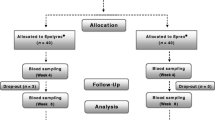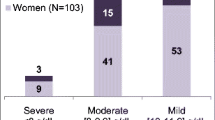Abstract
Introduction
Anaemia is present in 30%–90% of all patients with cancer, and its origin is multifactorial. Human recombinant erythropoietin has been shown to be useful in treating anemia in patients with cancer. The aim of this study was to evaluate the effectiveness of treatment of anaemia with epoetin alfa (EPO) given as a single weekly dose, and its repercussions on quality of life (QoL).
Materials and methods
From January to October 2002, a total of 139 patients referred to our service for radiotherapy (RT) had anemia and received treatment with EPO as a single weekly dose of 40,000 IU subcutaneously, with oral iron supplement. If haemoglobin (Hb) values after 1 month of treatment did not increase by≥1 g/dl, the dose was increased to 60,000 IU/week. Treatment with EPO ended when Hb values reached ≥14 g/dl or one month after the end of RT regardless of Hb values. QoL was evaluated with the Functional Assessment of Cancer Therapy-Anaemia subscale (FACT-An) and the Cancer Linear Analogue Scale (CLAS).
Results
Mean Hb at the start of treatment with EPO was 11.49±1.08 g/dl, and the mean value at the end of treatment was 14.52±1.41 g/dl (p<0.001). The mean increase in Hb was 2.97±2.91 weeks. In 11 patients (7.9%) the dose was increased after 4 weeks. In 84 patients (60.4%) EPO treatment was implemented before the commencing of RT. Mean Hb values in this group was 11.34±1.11 g/dl at the start of EPO treatment, 12.69±1.56 g/dl at the start of RT, 13.96±1.54 g/dl at the end of RT and 14.68±1.3 g/dl at the end of EPO treatment (p<0.001). In 55 patients (39.6%) anaemia developed during RT and, therefore, EPO treatment was implemented after commencing of RT. In this group the mean Hb values were 12.29±1.6 g/dl at the start of RT, 11.72±1.01 g/dl at the start of EPO treatment, 13.97±1.53 g/dl at the end of RT and 14.28±1.54 g/dl at the end of EPO treatment (p<0.001). Hemoglobin levels at the start of EPO were lower in patients who commenced EPO before RT (p<0.05). In 60 patients who received combined RT and chemotherapy, mean Hb values were 11.42±1.16 g/dl at the start of EPO and 13.98±1.55 g/dl at the end of EPO (p<0.005). In 75 patients who had received RT alone, the mean Hb values was 11.53±1.05 g/dl at the start of EPO and 14.98±1.17 g/dl at the end of treatment (p<0.001). Patients treated with RT alone had higher Hb levels at the end of RT and at the end of EPO treatment than did patients who had received combined treatment (p<0.005). The duration of EPO treatment was shorter in the group treated with RT alone than in the combined treated group (6.41±2.99 weeks versus 7.96±2.67 weeks; p<0.005). No significant differences were observed in FACT-An and CLAS scores at the beginning and the end of the study.
Conclusions
Treatment with epoetin alfa as a single weekly dose significantly increased Hb levels in patients with cancer who were undergoing radiotherapy. The response was greater in patients treated with radiotherapy alone than in those receiving combined therapy. The duration of EPO treatment was shorter in the group treated with radiotherapy alone than in the combined treatment group.
Similar content being viewed by others
References
Knight K, Wade S, Balducci L. Prevalence and outcomes of anemia in cancer: a systematic review of the literature. Am J Med. 2004;116(7A):11S-26S.
Coiffier B. The impact and management of anaemia in haematological malignancies. Med Oncol. 2000;17 Suppl 1:S2–10.
Mercadante S, Gebbia V, Marrazzo A, Filosto S. Anaemia in cancer: pathophysiology and treatment. Cancer Treat Rev. 2000;26(4):303–11.
Hawliezek R, Oismuller R. The effect of systematic rHu-EPO treatment before and during radiotherapy (radiochemotherapy) in unselected anemic cancer patients. Preliminary results of an Austrian multicenter observation study (meeting abstract). Proc Annu Meet Am Soc Clin Oncol. 1999;18:A2310.
Henke M, Bechtold C, Momm F, Dorr W, Guttenberg R. Blood hemoglobin level may affect radiosensitivity- preliminary results on acutely reacting normal tissues. Int J Rad Oncol Biol Phys. 2000;48:339–45.
Vaupel P, Thews O, Hoeckel M, Höckel M. Treatment resistance of solid tumors: role of hypoxia and anemia. Med Oncol. 2001;18:243–59.
Frommhold H, Guttenberger R, Henke, M. The impact of blood hemoglobin content on the outcome of radiotherapy. The Freiburg experience. Strahlenther Onkol. 1998; 174Suppl IV:31–4.
Kumar P. Impact of anemia in patients with head and neck cancer. Oncologist. 2000;5 Suppl. 2:13–8.
Jazieh AR, Hussain M, Howington JA, et al. Prognostic factors inpatients with surgically resected stages I and II non-small cell lung cancer. Ann Thorac Surg. 2000;70:1168–71.
Dunst J. Hemoglobin level and anemia in radiation oncology: prognostic impact and therapeutic implications. Sem Oncol. 2000;27:4–8.
Harrison LB, Chadha M, Hill RJ, Shasha D. Impact of tumor hypoxia and anemia on radiation therapy outcomes. Oncologist. 2002;7:492–508.
Ardizzoni A, Cafferata MA, Rosso R. Epoietin alfa in lung cancer. Tumori. 1998;84 Suppl 1:S20–6.
Quirt I, Kovacs M, Burdette-Radoux S, Dolan S, McKenzie M, Tang SC. Epoetin Alfa reduces transfusion requirements, increases hemoglobin (Hb) and improves quality of life (QofL) in cancer patients with anemia who are not receiving concomitant chemotherapy (Meeting abstract). Proc Annu Meet Am Soc Clin Oncol. 1999;18:A2295.
Henke M, Guttenberger R, Barke A, Pajonk F, Pötter R, Frommhold H. Erythropoietin for patients undergoing radiotherapy: a pilot study. Radiother Oncol. 1999;50:185–90.
Beguin Y. Prediction of response to treatment with recombinant human erythropoietin in anaemia associated with cancer. Med Oncol. 1998: 15 Suppl 1:S38–46.
Gabrilove JL, Cleeland CS, Livingston RB, et al. Clinical evaluation of once-weekly dosing of epoetinum alfa in chemotherapy patients: improvements in hemoglobin and quality of life are similar to three-times-weekly dosing. J Clin Oncol. 2001;19:2875–82.
Cella D. The Functional Assessment of Cancer Therapy-Anemia (FACT-An) scale: A new tool for the assessment of outcomes in cancer anemia and fatigue. Sem Hematol. 1997;34 Suppl 2:13–9.
McCormack HM, Horne DJ, Sheather S. Clinical applications of visual analog scales: A critical review. Psychol Med. 1988;18:1007–19.
Shasha D, Harrison LB. Anemia treatment and the radiation oncologist: optimising patient outcomes. Oncology. 2002;15(11):1486–91.
Bush RS. The significance of anemia in clinical radiation therapy. Int J Radiat Oncol Biol Phys. 1986;12:2047–50.
Evans JC, Bergjo P. The influence of anemia on the results of radiotherapy in carcinoma of the cervix. Radiology. 1965;84:709–17.
Kapp DS, Fischer D, Gutiérrez E, et al. Pretreatment prognostic factors in carcinoma of the uterine cervix: A multivariate analysis of the effect of age, stage, histology and blood counts on survival. Int J Radiat Oncol Biol Phys. 1983;9:445–55.
Vigario G, Kurohara SS, George FW. Association of hemoglobin levels before and during radiotherapy with prognosis in uterine cervix cancer. Radiology. 1973;106:649–52.
Quilty PM, Duncan W. The influence of hemoglobin level on the regression and long term local control of transitional cell carcinoma of the bladder following photon irradiation. Int J Radiat Oncol Biol Phys. 1986;12:1735–42.
Bryne M, Eide GE, Lilleng R et al. A multivariate study of the prognosis of oral squamous cell carcinomas: are blood group and hemoglobin new prognostic factors? Cancer. 1991;68:1994–8.
Overgaard J, Hansen HS, Andersen AP, et al. Misonidazole combined with split-course radiotherapy in the treatment of invasive carcinoma of larynx and pharynx: Report from the DAHANCA 2 study. Int J Radiat Oncol Biol Phys. 1989;16:1065–8.
Glaser CM, Millesi W, Kornek GV, et al. Impact of hemoglobin level and use of recombinant erythropoietin on efficacy of preoperative chemoradiation therapy for squamous cell carcinoma of the oral cavity and oropharynx. Int J Radiat Oncol Biol Phys. 2001;50:705–15.
Caro JJ, Salas M, Ward A, Goss G. Anemia as an independent prognostic factor for survival in patients with cancer. Cancer. 2001;91:2214–21.
Lavey RS, Dempsey WH. Erythropoietin increases hemoglobin in cancer patients during radiation therapy. Int J Radiat Oncol Biol Phys. 1993;27:1147–52.
Casas F, Vinolas N, Farrus B, et al. Karnofsky (KPS) Score Benefit of Erythropoietin (Epo) in Lung Cancer (LC) Patients (pts) Undergoing Concurrent Chemoradiation Therapy (Ch-RT) (Meeting abstract). Proc Annu Meet Am Soc Clin Oncol. 1999;18:A1875.
Rosen F, Brockstein B, Haraf D, et al. Multicenter Randomized Phase II Study of 1 Hour Infusion Paclitaxel, (T), Fluorouracil (5-FU) and Hydroxyurea (HU) with Concomitant Hyperfractionated (BID) Radiotherapy (XRT) with or Without Erythropoietin (EPO) for Advanced Oral, Pharynx and Larynx Cancer-An Interim Analysis. (Meeting abstract). Proc Annu Meet Am Soc Clin Oncol. 1999;18:A1519.
Samper P, Rodríguez A, Martín de Miguel M, et al. Tratamiento de la anemia en pacientes con cáncer en tratamiento radioterápico con epoetinum alfa 10.000 UI/tres veces a la semana y 40.000 IU/una vez a la semana, via subcutánea. Oncología. 2002;25(8):364–70.
Thews O, Koening R, Kelleher DK, Kutzner J, Vaupel P. Enhanced radiosensitivity in experimental tumours following erythropoietin treatment of chemotherapy-induced anaemia. Br J Cancer. 1998;78:752–6.
Bohlius J, Langensiepen S, Schwarzer G, et al. Erythropoietin for patients with malignant disease. Cochrane Database of Systematic Reviews. 2004;CD003407.
Leyland-Jones B. Breast cancer trial with erythropoietin terminated unexpectedly. Lancet Oncol. 2003;4:459–60.
Henke M, Laszig R, Rube C, et al. Erythropoietin to treat head and neck cancer patients with anaemia undergoing radiotherapy: randomised, double-blind, placebo-controlled trial. Lancet. 2003;362:1255–60.
Bokemeyer C, Aapro MS, Courdi A, et al. EORTC guidelines for the use of erythropietic proteins in anaemic patients with cancer. Eur J Cancer. 2004;40:2201–16.
Littlewood TJ, Bajetta E, Nortier JWR, Vercammen E, Rapoport, B. Effects of Epoetin alfa on hematologic parameters and Quality of life in cancer patients receiving nonplatinum chemotherapy: results of randomised, double-blind, placebo-controlled trial. J Clin Oncol. 2001;19(11):2865–74.
Crawford J, Cella D, Cleeland CS, et al. Relationship between changes in haemoglobin level and quality of life during chemotherapy in anemic cancer patients receiving epoetinum alfa therapy. Cancer. 2002;95:888–95.
Littlewood TJ, Nortier J, Rapoport B, et al. Epoetin alfa corrects anemia and improves quality of life in patients with hematologic malignancies receiving non-platinum chemotherapy. Hematol Oncol. 2003;21:169–80.
Author information
Authors and Affiliations
Corresponding author
Rights and permissions
About this article
Cite this article
Samper Ots, P.M., Pérez, A.R., Carrizosa, C.L. et al. Once-weekly dose of epoetinum alfa in cancer patients with anemia receiving radiotherapy. Clin Transl Oncol 7, 486–492 (2005). https://doi.org/10.1007/BF02717001
Received:
Accepted:
Issue Date:
DOI: https://doi.org/10.1007/BF02717001




